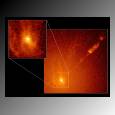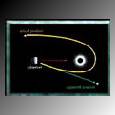BLACKHOLES

![]()
What is a blackhole?
![]()
Loosely speaking, a black hole is a region of space that has so much mass concentrated in
it that there is no way for a nearby object to escape its gravitational pull. Since our
best theory of gravity at the moment is Einstein's general theory of relativity, we have
to delve into some results of this theory to understand black holes in detail, but let's
start of slow, by thinking about gravity under fairly simple circumstances.
Suppose that you are standing on the surface of a
planet. You throw a rock straight up into the air. Assuming you don't throw it too hard,
it will rise for a while, but eventually the acceleration due to the planet's gravity will
make it start to fall down again. If you threw the rock hard enough, though, you could
make it escape the planet's gravity entirely. It would keep on rising forever. The speed
with which you need to throw the rock in order that it just barely escapes the planet's
gravity is called the "escape velocity." As you would expect, the escape
velocity depends on the mass of the planet: if the planet is extremely massive, then its
gravity is very strong, and the escape velocity is high. A lighter planet would have a
smaller escape velocity. The escape velocity also depends on how far you are from the
planet's center: the closer you are, the higher the escape velocity. The Earth's escape
velocity is 11.2 kilometers per second (about 25,000 m.p.h.), while the Moon's is only 2.4
kilometers per second (about 5300 m.p.h.).
What would happen if a person fell into a black hole? 
![]()
At first, you don't feel any gravitational forces at all. Since you're in free fall, every
part of your body and your spaceship is being pulled in the same way, and so you feel
weightless. (This is exactly the same thing that happens to astronauts in Earth orbit:
even though both astronauts and space shuttle are being pulled by the Earth's gravity,
they don't feel any gravitational force because everything is being pulled in exactly the
same way.) As you get closer and closer to the center of the hole, though, you start to
feel "tidal" gravitational forces. Imagine that your feet are closer to the
center than your head. The gravitational pull gets stronger as you get closer to the
center of the hole, so your feet feel a stronger pull than your head does. As a result you
feel "stretched." (This force is called a tidal force because it is exactly like
the forces that cause tides on earth.) These tidal forces get more and more intense as you
get closer to the center, and eventually they will rip you apart. 
If a black hole existed, would it suck up all the matter in the Universe?
![]()
No. A black
hole has a "horizon," which means a region from which you can't escape. If you
cross the horizon, you're doomed to eventually hit the singularity. But as long as you
stay outside of the horizon, you can avoid getting sucked in. In fact, to someone well
outside of the horizon, the gravitational field surrounding a black hole is no different
from the field surrounding any other object of the same mass. In other words, a
one-solar-mass black hole is no better than any other one-solar-mass object (such as, for
example, the Sun) at "sucking in" distant objects.
Is there any evidence that black holes exist? 
![]()
Yes. You can't see a black hole directly, of course, since light can't get past the horizon. That means that we have to rely on indirect evidence that black holes exist.
Suppose you have found a region of space where you think there might be a black hole. How can you check whether there is one or not? The first thing you'd like to do is measure how much mass there is in that region. If you've found a large mass concentrated in a small volume, and if the mass is dark, then it's a good guess that there's a black hole there. There are two kinds of systems in which astronomers have found such compact, massive, dark objects: the centers of galaxies (including perhaps our own Milky Way Galaxy), and X-ray-emitting binary systems in our own Galaxy
How to black holes evaporate? 
![]()
Back in the 1970's, Stephen Hawking came up with theoretical arguments showing that black
holes are not really entirely black: due to quantum-mechanical effects, they emit
radiation. The energy that produces the radiation comes from the mass of the black hole.
Consequently, the black hole gradually shrinks. It turns out that the rate of radiation
increases as the mass decreases, so the black hole continues to radiate more and more
intensely and to shrink more and more rapidly until it presumably vanishes entirely.
![]()
